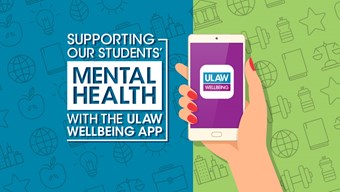During our Diversity Matters Disability event late last year, ULaw alumna and casework officer at the Office of the Kent Police and Crime Commissioner, Haleemah Farooq, spoke about being a visually impaired aspiring barrister. We sat down with Haleemah to learn more about her experiences and career aspirations.
By Cara Fielder. Published 7 March 2022. Last updated 8 July 2022.
I am a Casework Officer at the Office of the Police and Crime Commissioner (PCC). I deal with complaints made against the local police force and assist with reviews and appeals as the PCC’s office is one of the two review bodies for complaints made against the police, alongside the Independent Office for Police Conduct (IOPC).
I wanted to be involved in the ULaw Diversity Matters series because raising awareness regarding diversity is close to my heart. I like to take every opportunity I am offered to speak about my journey as a blind, Pakistani, Muslim, female aspiring barrister.
I have been fortunate enough to come from a supportive family who have taught me that I can achieve anything that I set my mind to. However, this is not the same case for others who come from my background, which saddens me. I believe that disability should be celebrated and accepted instead of pointed out and shown off.
My sight loss is my identity; it is something that I have to live with every day. People should be made aware of the challenges that disabled people face to appreciate the effort it takes to do simple tasks that they may take for granted. But the awareness must be made in a positive manner so as not to belittle the disabled person and equally not to shove disability down people’s throats.
Increased representation of any kind will better represent any sector. Law is the same. Representation is crucial in all sectors as it allows for a diverse task force, a difference of opinion, better understanding and vaster cultures. Diversity allows people to consider aspects that they had not done before. For example, being a white cane user has made my office more aware of me. They will say my name before speaking or will now describe something more detailed for my benefit. Equally, I am also Muslim, and this year I undertook fasting in the month of Ramadan. My colleagues were respectful, so not to speak of food and drink around me. This may not have been done if I did not work with them. Diversity allows people to shift in their thoughts and makes them think differently.
The police force has many initiatives to support disabled employees. I know for a fact that they are actively seeking to improve processes to align with their vision.
To support disability representation, students need to talk about it; some still believe that it is a topic that shouldn’t be spoken of. Talk to me, talk to someone who has a disability. Do not assume. Please just ask.
Just start the conversation. Once you have started, the hard bit is over. Disabled people are often looking for opportunities to suggest changes; however, someone needs to take the first step. I am not afraid to suggest changes in my position, and they have been welcomed. But I know that not everyone is as open and frank as me, but once the conversation has begun, the awkward part is done.
Here are a few outlets for students wanting to learn more about disability representation in the workplace:
- Royal National Institute of Blind People (RNIB)
- Guide Dogs
- TikTok #BlindTok or hashtags in general on any social media
- Disability’s Not A Bar – This is a podcast run and hosted by myself and a friend who are two disabled aspiring barristers. It has featured aspiring barristers, and we had our first qualified barrister on recently. The aim is to showcase disabled barristers and their journey to the Bar. We hopefully have a judge too. You may wish to follow us on Twitter, Instagram or like our Facebook
In this day and age, diversity and inclusion are far more achievable than they were a few years ago. This is because we have the law and the media on our side. We cannot fail to take this opportunity for change when the hard work of activists has set the ground before us.
Discover more about our series of Diversity Matters events.



